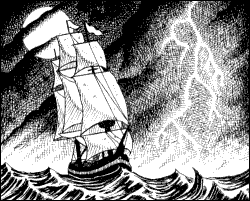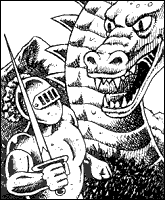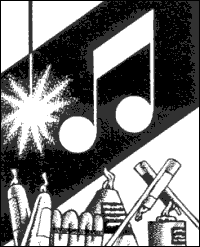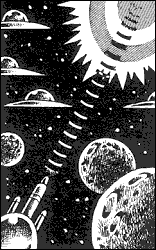| ZX-81 Software Scene |

FEW NEW GAMES for the ZX-81 have been released recently. Only two of the major software companies have continued their range of cassettes for the machine. The first is Quicksilva, which has launched a new batch of games for the 16K ZX-81. They include a cassette containing two arcade-type games and two adventures.
The first game on the arcade tape is Damper. The player takes the part of a grid damper who must turn off the power on a grid before some evil leeches do permanent damage to the power cables.
To attack the leeches you must trace round the squares which make up the grid. When you have completed a track round a square it will turn black as the power runs down in that sector of the grid. If the leeches catch your player you will have an electrifying experience.
The game includes a hall of fame. The only problem is that you are usually dead before your name is entered with the others of the elite of grid runners.
Damper is an original and excellent game and includes some stunning graphics.
Also included on the tape is a Pac-man-type game, Glooper. There are seven levels of play and the seventh is very fast. The ghosts which inhabit the maze are intelligent, for a change, and they will always get the Pac-man on the most difficult level. Both games are available on cassette for £4.95.
The first of the adventures from Quicksilva is Pioneer Trail. The year is 1842 and you and your family join the pioneer trail to Oregon from Westport Landing, Missouri. You have 40 weeks to cover 2,000 miles and all you have for support is two tired horses and a wagon.
At the start of the game you have $700 which you can spend on oxen, food, bullets, clothes and supplies. You can use the bullets to hunt or you can drop into the local fort for extra supplies on the journey. Along the way you will meet Indians and have to fight your way through thick fog and blizzards.
Pioneer Trail costs £3.95 and includes both adventure and arcade graphics.
The other adventure is Ocean Trader. The game is again set in the 19th century. You are the captain of a 130-ton sailing barque who must gain £500,000 before the game is completed.
You can hold 50 units of cargo aboard the vessel, including arms, coal, whisky and bullion. The arms and bullion are, of course, illegal and will have to be jettisoned if you encounter trouble and have to return to port. The dangers of your voyages between the ports of Liverpool, London, Newcastle and Southampton include sea mists, pirates and freak storms. There is also the danger of having to pay the loan for your ship when you have no money. If that happens you could lose your ship. Ocean Trader costs £3.95. All these games are available from Quicksilva Ltd, Southampton.
MIKRO-GEN is the other company which is still retaining games for the ZX-81 sector of the market. Its releases include an excellent version of an arcade game called Tempest for the 16K ZX-81.
Your ship is at the top of the screen and a host of invaders shoot across from the right-hand side. You have to destroy them without hitting the missiles which are launched against you or the devilish spikes which trail behind the spinners.
The game is played through different levels or sectors. When you have destroyed all the aliens in one sector your ship will move to the right of the screen and into the next sector.
The playing level numbers are arranged in odd order, as the most difficult level is one and the easiest is five. Level one should be used only by those who want to wear out their laser fingers and the keyboard at the same time. Tempest costs £3.95.
One of the cassettes in the range is for the 1K ZX-81. It contains three games, Impact, Target and Death Ray.
Impact uses a full-screen display and, surprisingly, the game has a title page. The aim is to steer your spaceship through an asteroid storm. It may not be very original but for a 1K game, written in Basic, we must give credit where it is due.
The second game is Target. You have a limited period in which to hit as many targets as you can, using your gun. You have to align the gunsight over a target and the gun fires automatically, destroying the target.
The last game is Death Ray. It imitates space invaders but the aliens do not play fair. You can fire your gun only vertically but they can fire vertically and diagonally. The Games Pack for the 1K ZX-81 costs £3.95. We have not seen a city bomber game for the 16K ZX-81 for a long time, so when Bomber arrived to be reviewed we did not know whether to laugh or cry. The game is below the standards we have expected from companies producing ZX-81 software.
The bomber aircraft in question moves across the screen from left to right. The player must drop bombs on the city below to clear a runway on which to land. If a finger is kept on the rocket button it is not difficult to level the skyscrapers which stand in the way. Bomber costs £3.95.
| Spectrum Software Scene |
THE LATEST Spectrum releases from Quicksilva bear a striking resemblance to original arcade games. The new offering is Astro Blasters and looks like a cross between two arcade favourites, Phoenix and Avenger.
Your spaceship is at the bottom of the screen and a squadron of alien birds wing their way through space, dropping clusters of bombs on you. If you manage to survive two attack waves, your spacecraft will run into a meteor storm which is sure to destroy it. The game is very colourful but the illusion of travelling through space is spoiled because the stars seem to appear on the screen at random and there is no scrolling effect as you move through space.
The second game is Frenzy and it looks like the arcade game Berzerk. You are in a maze patrolled by evil robots, a wandering ball called Orville and a mine-layer.
The robots can be destroyed but your laser gun will fire only in the direction in which you last moved. That can be awkward at times but it adds to the fun.
You will not be able to kill Evil Orville, so if you meet him it is best to dodge out by one of the four exits in the maze. You must also be careful not to step on the mines.
Astro Blasters and Frenzy are both available for the 16K and 48K Spectrum at £4.95 each.

IN KNIGHT'S QUEST, a graphics adventure for the 48K Spectrum, you can go boldly where no knight has gone before. The object is to find Merlin's lost treasure. On your way you will encounter scorpions and dragons, battle with elves and rescue a princess from the wicked Wizard of Trill.
The game has more than 120 locations and many are underground. A graphics representation of most of the locations is shown in one corner of the screen and the use of machine code to speed the game when transferring from one location to another is apparent. Knight's Quest is definitely a game for all who like dungeons and dragons adventures.
Phipps Associates, manufacturer of Knight's Quest, also has a 16K version of the Nowotnik Puzzle for the Spectrum. It is fully machine-coded and involves the player trying to out-think the computer in moving an 'L' shape round the playing board. The person, or machine, who cannot move the 'L' loses the game.
Both games are interesting. Knight's Quest is available for £5.95 and the Nowotnik Puzzle for £4.95. Both can be obtained from Phipps Associates, Surrey.

SOME SOFTWARE houses seem determined to dispense with paper and pencils. They are overwhelmed by the excitement of new technology and do not stop to think whether the jobs they are asking computers to do would be better done by a few simple calculations.
The latest company to offer something of the kind is Medidata with its Cycle Planner program for the 48K Spectrum. It analyses menstrual cycles, working out the most recent cycle, the next period date, the maximum fertility date and what the company calls unsafe dates. Also when conception occurs it can predict the most likely date of birth.
As the program has been designed to be used by beginners to computers, the chances of entering errors are small.
The information obtained is worthy and well-presented but could be determined with the same degree of accuracy in the time it takes to load the cassette. On the other side is Growth Tracker, a menu-driven database which estimates the growth of a baby before birth and for the first 24 months of its life.
It also shows the common illnesses which can affect young children, with their treatments.
The cassette costs £7.25 and Medidata says that its aims are as an aid to women and also to introduce more people to computer technology.
Both aims are commendable but there are cheaper and less complicated ways of doing them.
DESPITE the glossy advertisements, Spectrum games from Imagine Software seem to be only average. The first program to be released is Arcadia. The player controls a spaceship at the bottom of the screen and waves of enemy fighter swoop in, dropping bombs. There is a series of levels to the game and on each level the spaceship Arcadia faces a different foe.
The colour and explosion effects in the game are unusual and the range of space invaders was interesting but the game lost its appeal after a few hours and became just another version of beat the evil nasties.
The second game also gave a good first impression but that wore off after play. The game centres on a black hole which sucks in all the garbage of the universe. The player controls an inter-galactic refuse collector.
The rubbish is displayed as three-dimensional cubes and pyramids and the collector must push it into the black hole. If the collector gets too near the black hole it will be sucked in.
Both games are for the 16K and 48K Spectrum and cost £5.50 each.

ALL SPECTRUM owners now have the chance to name that tune or, in this case, name that musical note with the Software Cottage Firework Music.
The software is part game and part adventure into education. You have to guess the name of a musical note which is drawn on the screen using high-resolution graphics. You cannot take all day with your guess, because a spark descending into a box of fireworks sets the time limit.
If you make a correct guess you are awarded one firework in the box. If you run out of time the spark will reach the box and all those fireworks will go off with a bang. During the game you can have three boxes of fireworks and if you collect sufficient rockets you will be treated to a display which would equal any on November 5.
The game can be easy. All you have to remember is the EGBDF and FACE lessons which are usually taught to every schoolchild.
Firework Music is an ideal teaching aid for young children learning the rudiments of musical theory. It also uses a good psychological approach with a rewarding display at the end of the teaching session.
The game is available from Software Cottage, Leics. It costs £5.
MICROMEGA, known for its selection of 1K ZX-81 games, has launched into the Spectrum market with a series of games which will work on both machines.
Monte Carlo is a cassette with two games on it. The first is Blackjack, in which you must try to break the bank - your computer opponent. The simulation has good graphics and the computer plays well but the reason for putting yet more card games on to a computer, especially one of Spectrum potential, is difficult to appreciate. To give the cassette a fair run for its money we moved to Craps, an American dice game in which you must throw a 7 or 11 on the first throw to win. If you throw a 2, 3, or 12 you lose.
The game is excellent and very difficult to beat but the same criticism can be made as for Blackjack. It would be better to have a pair of dice and throw them instead of waiting for the computer to load to program to do it.
The second Micromega Spectrum cassette is a little more taxing on the mind and demands more concentration. Dominoes, so far as we know, is the first simulation of the game to be put on to a computer.
The simulation is good and so are the graphics but, unfortunately, the same can be said as about the first cassette. It is difficult to understand why traditional card and dice games are put on to a computer time and again. There are already hundreds of versions of Blackjack, Pontoon, Twenty-one, and Craps available for Sinclair machines.

THE MANUFACTURER of Black Hole, for the 16K and 48K Spectrum, claims that the concept of this space game is completely new. So far as we can tell, the claim is not exaggerated.
The player must move around a black hole using positive and negative ion guns and a neutron blaster to destroy the hordes of aliens which spin and slide down the screen with terrifying speed.
The explosion effects are some of the best we have seen and the effects of the weapons are very interesting. When the player fires the neutron gun the ray emits curves, destroying everything in its path. That deadly advantage is soon equalled by the invaders, who storm down the screen destroying everything but the black hole which glows with odd colours.
The game has a learning mode in which you can practice your destructive talents. That mode contains no score and your spaceship will not be destroyed as in the play mode.
As a first effort in the Spectrum market Quest Software has produced an entertaining and original space game. Black Hole costs £5.50.